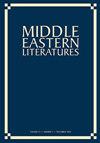Experimentation and the absurd in two plays by Syrian playwright Walīd Ikhlāṣī
IF 0.2
4区 文学
0 LITERATURE
引用次数: 0
Abstract
ABSTRACT Walīd Ikhlāṣī (1935–2022) is a modernist Syrian playwright who was part of a broader Arab movement experimenting with the theatre of the absurd. His experimental writings are based on a fundamental refusal to accept ready-made values – literary, cultural, or philosophical. In this experimentation he developed a truly unique style, set apart from his contemporaries. Examining two one-act plays: Ṭubūl al-iʿdām al-ʿasharah (The Ten Drums of Execution) and al-Mutʿah 21 (Pleasure 21), both published in 1965, this paper looks at his use of juxtaposition to create a productive ambiguity, and how this ambiguity is underscored in the works using author comments/stage direction, and varied techniques of dialogue. In both works, we find the tensions created by his experimentation bring forth a powerful sense of despair and injustice.叙利亚剧作家wald Ikhlāṣī两部戏剧中的实验与荒诞
瓦尔瓦德Ikhlāṣī(1935-2022)是一位现代主义的叙利亚剧作家,他参与了一场更广泛的阿拉伯运动,尝试荒诞派戏剧。他的实验作品是建立在拒绝接受现成的文学、文化或哲学价值的基础上的。在这个实验中,他发展了一种真正独特的风格,与同时代的人不同。本文考察了1965年出版的两部单幕戏剧:Ṭubūl al-i - dām al- al- ahu asharah(死刑的十鼓)和al- mut - ahu 21(快乐21),研究了他使用并列来创造一种富有成果的模糊性,以及如何使用作者评论/舞台指导和各种对话技巧来强调这种模糊性。在这两件作品中,我们发现他的实验所造成的紧张带来了一种强烈的绝望和不公正感。
本文章由计算机程序翻译,如有差异,请以英文原文为准。
求助全文
约1分钟内获得全文
求助全文

 求助内容:
求助内容: 应助结果提醒方式:
应助结果提醒方式:


